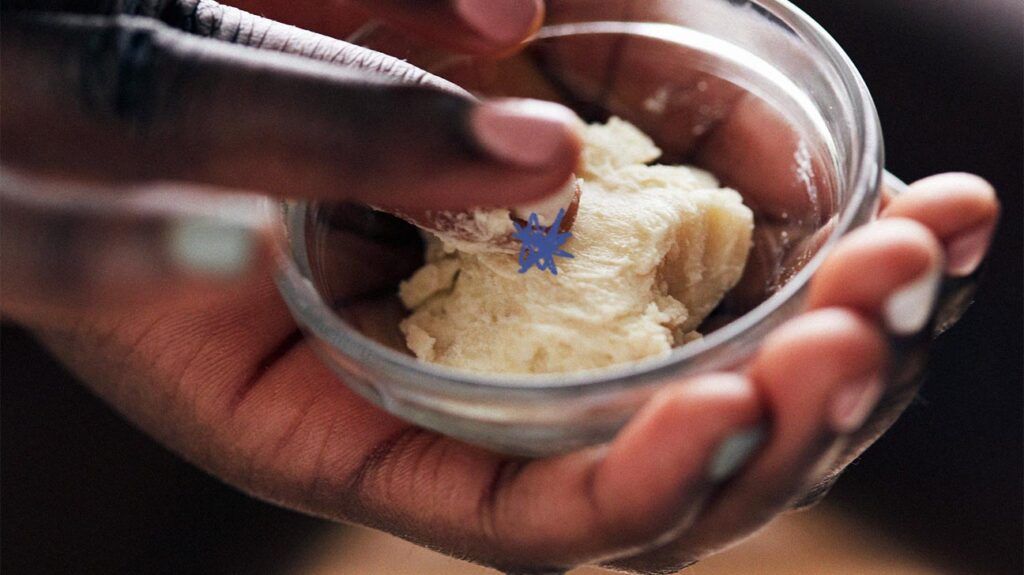Using shea butter for eczema may ease skin dryness and itchiness
due to its anti-inflammatory and antioxidant properties.
While there is no cure for eczema, treatment and management strategies are effective. These strategies focus on avoiding triggers, reducing inflammation with topical steroids, and increasing skin hydration.
People may use various lotions and moisturizers to maintain the skin’s natural barrier function and improve hydration. Some natural moisturizers may also have similar effects.
One example includes shea butter, a natural fat that may help eczema by soothing irritated skin.
This article explores whether shea butter helps with eczema, what properties it has, and whether it can stop itching. It also compares it to other butters, outlines any possible risks, and how to use it.

Shea butter comes from the kernels of the shea tree (Vitellaria paradoxa).
It has anti-inflammatory and antioxidant properties that
Its rich composition includes a range of bioactive compounds that benefit skin health. These compounds include:
- sterols
- terpenes
- tocopherols (vitamin E)
- phenols
Anecdotally, these substances contribute to shea butter’s benefits by:
- soothing irritation
- promoting healing
- protecting against environmental oxidative damage
Although shea butter cannot cure eczema, it is a valuable addition to helping manage the condition.
Anecdotally, people refer to shea butter as an emollient. This means that rather than adding moisture to the skin, it creates a protective barrier on the outermost skin’s surface. The barrier locks in moisture and prevents water loss.
Individuals with eczema have damaged skin barriers, making the skin more sensitive and less able to retain water. Therefore, maintaining skin moisture levels is critical for eczema management.
Itching is a
Anecdotally, individuals report that shea butter may help reduce itching to some extent due to its hydrating properties and ability to soothe irritated skin.
However, its effectiveness in alleviating itching varies from person to person. While it can provide relief for many, it may not eliminate itching for others with more severe eczema symptoms.
Shea butter is not the only natural butter or oil used for skin care. Other options, such as coconut oil, cocoa butter, and mango butter, may share some similarities with shea butter, such as its moisturizing and skin-soothing properties.
What the research says
Many people use cocoa butter to relieve the skin dryness of eczema or psoriasis. Although no clinical trials support its use, anecdotal reports suggest it may help. However, the National Eczema Association does not list it as an ingredient that may help eczema-prone skin.
Similarly, people may find mango butter useful as it shares many similar properties to cocoa butter. However, there is little research to support its use in eczema.
Anecdotally, experts consider shea butter generally safe for most adults, including those with eczema. However, some individuals may be allergic to shea butter. Therefore, a person needs to perform a patch test on a small area of skin before applying shea butter extensively.
If caregivers consider using shea butter on babies or children with eczema, they should consult a pediatrician or dermatologist first to ensure its safety.
Anecdotally, if people want to use shea butter for eczema management, they need to:
- Choose unrefined shea butter: Unrefined or raw shea butter retains more of its natural healing properties. Choose organic if possible to reduce the risk of irritants in the product.
- Apply after bathing: Apply shea butter immediately after bathing or showering to lock in moisture.
- Use sparingly: A little goes a long way. Start with a small amount and apply it gently to affected areas.
Eczema resources
Visit our dedicated hub for more research-backed information and in-depth resources on eczema.
Shea butter is a valuable addition to an eczema management routine for many people living with eczema. It has skin-protective properties that may help lock moisture into the skin and may calm irritation through its anti-inflammatory properties.
Shea butter is safe for most people. However, a person should first perform a patch test on a small area of skin to ensure they have no reactions. Caregivers should also consult a doctor before using shea butter on children’s skin to avoid safety issues.
